 Petzlover
Petzlover Brussels Griffon is originated from Belgium but Norrbottenspets is originated from Sweden. Brussels Griffon may grow 26 cm / 10 inches shorter than Norrbottenspets. Brussels Griffon may weigh 9 kg / 19 pounds lesser than Norrbottenspets. Brussels Griffon may live 3 years less than Norrbottenspets. Both Brussels Griffon and Norrbottenspets has almost same litter size. Brussels Griffon requires Moderate Maintenance. But Norrbottenspets requires Low Maintenance
Brussels Griffon is originated from Belgium but Norrbottenspets is originated from Sweden. Brussels Griffon may grow 26 cm / 10 inches shorter than Norrbottenspets. Brussels Griffon may weigh 9 kg / 19 pounds lesser than Norrbottenspets. Brussels Griffon may live 3 years less than Norrbottenspets. Both Brussels Griffon and Norrbottenspets has almost same litter size. Brussels Griffon requires Moderate Maintenance. But Norrbottenspets requires Low Maintenance
 The Brussels Griffon is one of the three different types of Griffons. There is the Belgian, the Petit, and the Brussels Griffon. “Griffon” means wiry and the Brussels Griffon lives up to that moniker. The Brussels Griffon’s coat is longer than that of the Belgian Griffon and the Petit Brabanon (Griffon) has a smooth, short coat. The breed is probably originally developed by crossing Belgian street dogs with the Affenpinsher as early in the 1800’s. They were favored by the cabbies in Brussels as guard dogs. They were also bred to hunt rats. Sometime toward the end of the 19th century, the Griffon was again crossed this time with a pug. This accounts for the type of head that the Brussels Griffon has, namely a brachycephalic head. It also accounts for the smooth coat of the Petit Griffon. The modern-day Griffon may also have been crossed at some time with one or more of these breeds: the English Toy Spaniel, the Irish Terrier and the Yorkshire Terrier.
The Brussels Griffon is one of the three different types of Griffons. There is the Belgian, the Petit, and the Brussels Griffon. “Griffon” means wiry and the Brussels Griffon lives up to that moniker. The Brussels Griffon’s coat is longer than that of the Belgian Griffon and the Petit Brabanon (Griffon) has a smooth, short coat. The breed is probably originally developed by crossing Belgian street dogs with the Affenpinsher as early in the 1800’s. They were favored by the cabbies in Brussels as guard dogs. They were also bred to hunt rats. Sometime toward the end of the 19th century, the Griffon was again crossed this time with a pug. This accounts for the type of head that the Brussels Griffon has, namely a brachycephalic head. It also accounts for the smooth coat of the Petit Griffon. The modern-day Griffon may also have been crossed at some time with one or more of these breeds: the English Toy Spaniel, the Irish Terrier and the Yorkshire Terrier.
By 1880, the breed was recognized and appeared in the Brussels Exhibition of 1880. They were also found in paintings of the same era by the Flemish painter, Van Eyck. In the beginning of the 20th century, the breed was extremely popular with the nobility in Belgium. As with so many other breeds, the number of Brussels Griffon was greatly reduced during the First World War. It did not take them long however to make a comeback after the war. Their popularity then spread around the globe.
The European FCI considers the Brussels Griffon, the Belgian Griffon and the Petit Brabancon (Griffon) to be three separate breeds with no interbreeding among them. They are shown as three separate breeds in Europe, with the difference between the Belgian and Brussels being the accepted colors. The Brussels is only red in color while the Belgium Griffon can be in all other colors. In the United States the three types of Griffons are considered one breed with three varieties. Only the Brussels Griffon is recognized by the AKC. The difference in coat and color make for the different varieties in the U.S.
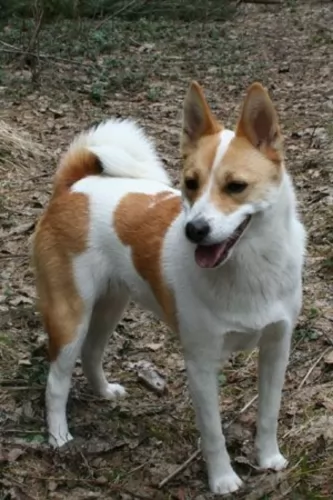 The Norrbottenspets is an ancient dog breed whose purpose has been to hunt, although these days he is a companion dog.
The Norrbottenspets is an ancient dog breed whose purpose has been to hunt, although these days he is a companion dog.
Hailing from Noorbotten, Sweden, it was after the second world war that the breed almost became extinct. This was because hunting dogs were no longer needed.
Luckily a breeding program was started, and in 1967 the Swedish Kennel Club registered the dog and a new standard was written. His friendly, amicable nature makes him a sought after companion today.
 All three types of Griffons are toy size dogs with short, thick bodies and distinctive brachycephalic heads. Regardless of coat color their muzzles and whiskers are black, and they have large eyes, also black, a mustache and beard. They have black eyelashes and a nose that is very black. All this is set against their red, beige, black or black and tan coat. Their forehead is dome shaped and the muzzle is short. The breed has small ears that are high up on the dog’s head. The ears might be cropped in the United States but would not be in Europe. The lower jaw is prominent and the jaw itself is undershot. They have black toenails and pads, with strong and muscular hind legs. The Griffon has a docked, high set tail in the U.S. and a full tail in Europe and all of the United Kingdom.
All three types of Griffons are toy size dogs with short, thick bodies and distinctive brachycephalic heads. Regardless of coat color their muzzles and whiskers are black, and they have large eyes, also black, a mustache and beard. They have black eyelashes and a nose that is very black. All this is set against their red, beige, black or black and tan coat. Their forehead is dome shaped and the muzzle is short. The breed has small ears that are high up on the dog’s head. The ears might be cropped in the United States but would not be in Europe. The lower jaw is prominent and the jaw itself is undershot. They have black toenails and pads, with strong and muscular hind legs. The Griffon has a docked, high set tail in the U.S. and a full tail in Europe and all of the United Kingdom.
The rough coated types have a dense and wiry coat and the standard encourages the hardest possible wire coat. Their heads are also wiry and long around the chin, cheeks, nose and eyes. They should be hand-stripped and never left ungroomed. The coat can matt if not taken care of adequately. One of the most important features of the Brussels Griffon is its human like face or monkey like appearance.
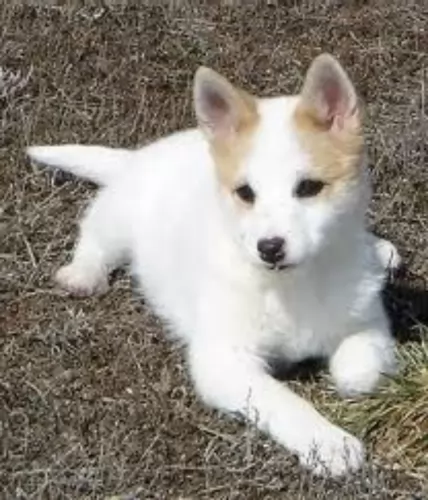 The Norrbottenspets is a small to medium sized spitz- type dog but he is muscular and compact. He stands at between 42 – 46cm in height and weighs in at between 8 and 15kg.
The Norrbottenspets is a small to medium sized spitz- type dog but he is muscular and compact. He stands at between 42 – 46cm in height and weighs in at between 8 and 15kg.
With good care he can live to be up to 15 years of age. The coat of the dog is straight and dense and you find quite a few colors such as white, yellow and reddish and sometimes there is a bit of ticking. He has a short to medium length waterproof coat which is dense.The outer coat is coarse with straight hair and the undercoat is soft and thick and the dog is a moderate shedder.
The head is wedge-shaped with erect ears, black nose and brown almond-shaped eyes. The muzzle is pointed and slim and the dog's tail is long and curls up over his back
Confident, alert and active, the Norbottenspets is an active, happy-go-lucky kind of dog, always looking for a game. It is why he gets on well with children in the home – he can sense that there is perhaps a better chance of a game with them.
He isn’t a prey-driven dog and gets on well with other pets in the home. He makes an excellent family pet and his very presence brings joy into a room as he is always cheerful.
He is stubborn and independent and will therefore require training and socialization to become obedient to your basic commands such as sit, lie-down and come.
 The Brussels Griffon is sociable, alert and very intelligent. She is very energetic, playful and loving. They bond deeply with their family. Housebreaking might be a challenge as it is with all toy/small breeds. They are incredibly lonely and restless when their people are not around them. They have great personalities, terrier like characteristics, and deep loyalty to their humans. They are great companions and love children. Just remember how small they are. They are susceptible to Little Dog Syndrome if the human does not establish themselves as the alpha right away.
The Brussels Griffon is sociable, alert and very intelligent. She is very energetic, playful and loving. They bond deeply with their family. Housebreaking might be a challenge as it is with all toy/small breeds. They are incredibly lonely and restless when their people are not around them. They have great personalities, terrier like characteristics, and deep loyalty to their humans. They are great companions and love children. Just remember how small they are. They are susceptible to Little Dog Syndrome if the human does not establish themselves as the alpha right away.
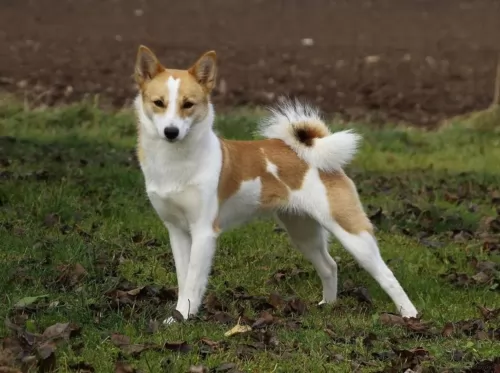 The Norrbottenspets is such an amicable, easy going pet and he is going to make you a loyal and loving canine companion. He bonds closely with his human family and will be bored and frustrated if left alone day after day in the back yard.
The Norrbottenspets is such an amicable, easy going pet and he is going to make you a loyal and loving canine companion. He bonds closely with his human family and will be bored and frustrated if left alone day after day in the back yard.
He is social and friendly and wants to be involved with the activities of his family. Feed him well, give him plenty of exercise and give him the love and care he deserves and he will make you an awesome canine companion.
 The Brussels Griffon is susceptible to many of the diseases and genetic conditions that many other toy or small dogs have. Flat-faced breeds like the Griffon also suffer from difficulty with breathing under certain weather conditions and they are known to snore. They should not be kept in hot, sunny, humid climates for this reason. They may also display patella luxation (slipping kneecaps) and hip dysplasia. Lastly, they are susceptible to ear infections. Dams are often in need of cesarean sections to deliver their litters. They have very serious health issues due to the head shape and flat face. These might include eye and respiratory issues and syringomyelia – a deadly neurological disease. They are susceptible to epilepsy, dental issues and eye lash issues.
The Brussels Griffon is susceptible to many of the diseases and genetic conditions that many other toy or small dogs have. Flat-faced breeds like the Griffon also suffer from difficulty with breathing under certain weather conditions and they are known to snore. They should not be kept in hot, sunny, humid climates for this reason. They may also display patella luxation (slipping kneecaps) and hip dysplasia. Lastly, they are susceptible to ear infections. Dams are often in need of cesarean sections to deliver their litters. They have very serious health issues due to the head shape and flat face. These might include eye and respiratory issues and syringomyelia – a deadly neurological disease. They are susceptible to epilepsy, dental issues and eye lash issues.
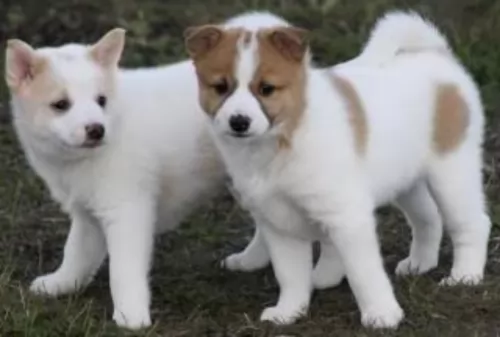 The Norrbottenspets life expectancy is between 12 and 15 years. These dogs are fairly healthy but there are always health concerns with any dog breed.
The Norrbottenspets life expectancy is between 12 and 15 years. These dogs are fairly healthy but there are always health concerns with any dog breed.
There are small numbers of the breed which are prone to a genetic condition affecting the brain and the result is poor coordination. It is sad to see because there is no known treatment and some dogs reach the stage where they can’t eat and they can’t control their toilet habits.
Dogs with hip dysplasia have an abnormal formation of the hip socket which can lead to arthritis, pain and the inability to get around. It is a genetic trait and you will need to get your pet to the vet for treatment and pain management.
 The Brussels Griffon can choke easily so take care with the size of kibble you feed them. They need about one fourth to one half of a cup of high quality dry food that is designed for small or toy dogs. Divide this amount into two or three small meals per day. Puppies should be fed more often than adults but never feed just one large meal per day. Be careful that your Brussels Griffon does not become obese.
The Brussels Griffon can choke easily so take care with the size of kibble you feed them. They need about one fourth to one half of a cup of high quality dry food that is designed for small or toy dogs. Divide this amount into two or three small meals per day. Puppies should be fed more often than adults but never feed just one large meal per day. Be careful that your Brussels Griffon does not become obese.
The Brussels Griffon, regardless of type has some very serious health issues due to the shape of their heads.
Brachycephalic Syndrome – This can cause all the respiratory issues as well as eye issues such as cataracts and corneal ulcers.
This is a very playful and energetic breed that needs at least some exercise every day. They love to play with their family. They are smart and easy to train. They love agility, obedience, barn hunt and tracking activities. You can just as effectively play with and exercise your Brussels inside as well as out.
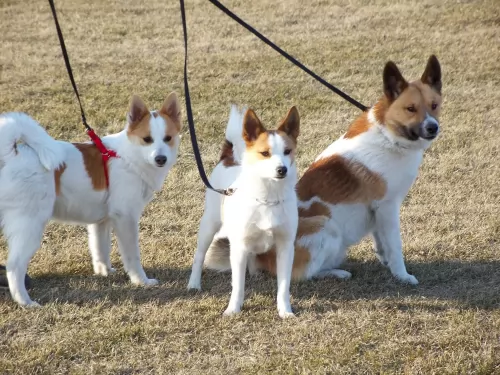 Your Norrbottenspet will be requiring a high-quality dog food if you want him to stand the best chances of being healthy. Home made food is always a good choice, but there are also some good commercially manufactured dog foods which are convenient.
Your Norrbottenspet will be requiring a high-quality dog food if you want him to stand the best chances of being healthy. Home made food is always a good choice, but there are also some good commercially manufactured dog foods which are convenient.
You want the food to have the necessary vitamins and minerals to ensure good health. Every dog will love a little bit of raw meat added to his kibble from time to time. Dogs love their meals to be consistent – no exotic, spiced foods to upset the stomach.
Boiled chicken, brown rice or pasta and cooked vegetables such as sweet potatoes, carrots and spinach can be chopped up and added to his kibble occasionally and this makes a splendid tasty treat for your pet.
You want to avoid your dog becoming overweight as this brings on a host of problems. Make sure he always has access to cool, fresh water.
The Norrbottenspets short to medium length coat will need brushing twice a week. They are clean looking dogs and you’ll find that they don’t have an unpleasant dog-smell around them.
Always check his eyes and ears for infections. Also check his teeth. A bad tooth may not be evident but it can negatively impact the immune system and cause illness with your dog.
The nails should also be cut to avoid them hooking on things.